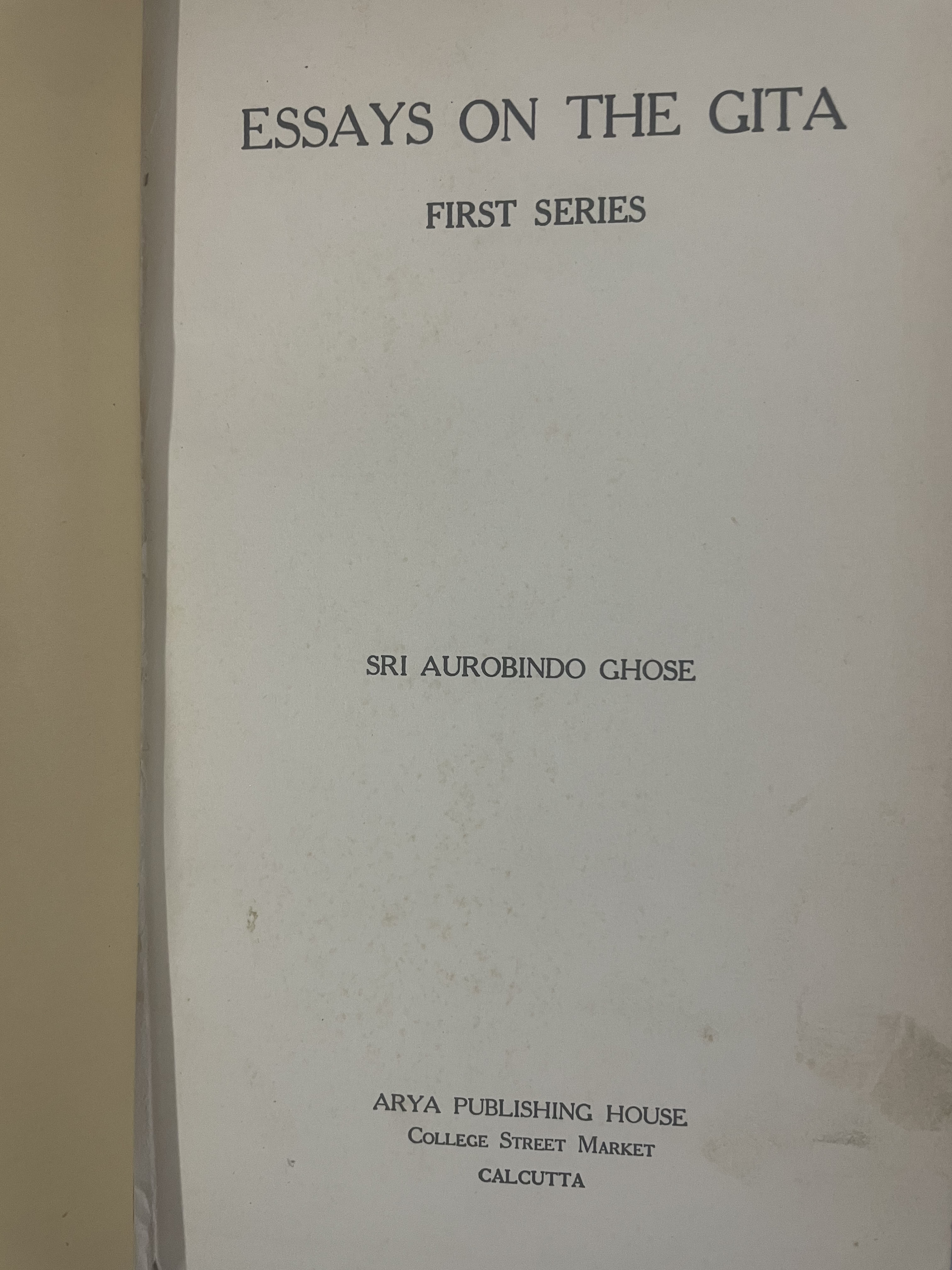Essays on the Gita vol 1

About
Summary
Exquisite
TOC
Details
Related
URL
Images
Overview
Essays on the Gita, particularly Volume 1, by Sri Aurobindo, is a profound exploration of the Bhagavad Gita, a foundational text of ancient Indian culture. Rather than a literal interpretation, Sri Aurobindo delves into the Gita's deeper philosophical and spiritual meanings, revealing its enduring relevance to human existence. These essays, initially published in the monthly review Arya, dissect the Gita, emphasizing its vast scope and the exacting demands it makes on one's character.Volume 1 of Essays on the Gita covers the introduction and the first four chapters of the Gita. It begins by establishing "Our Demand and Need from the Gita, setting the stage for a transformative journey through the text. Sri Aurobindo views the Gita as a bottomless sea filled with gems capable of enriching and transforming individuals. He guides the reader through the intricacies of the Gita, presenting it as a practical guide for navigating life's challenges.
Importance of Book
Reinterpreting the Gita for the Modern World: Sri Aurobindo presents the Gita not as a historical or religious text, but as a living guide applicable to the challenges of modern life. He extracts universal principles from the Gita's teachings, making them accessible to individuals from all backgrounds.
Synthesizing Eastern and Western Thought: Sri Aurobindo bridges the gap between Eastern and Western philosophical traditions, integrating insights from Vedanta, Yoga, and Western thought. His commentary appeals to both traditional Indian audiences and those familiar with Western intellectual frameworks.
Emphasizing Action and Transformation: Sri Aurobindo underscores the Gita's call to action, urging individuals to actively engage in the world while remaining rooted in spiritual principles. He reframes the concept of Karma Yoga, emphasizing selfless action as a path to self-realization.
Revealing the Gita's Esoteric Meaning: Sri Aurobindo uncovers the hidden layers of meaning within the Gita, revealing its profound insights into the nature of reality, the self, and the divine. He illuminates the Gita's esoteric teachings, guiding readers towards a deeper understanding of its spiritual message.
Connecting with India's Cultural Heritage: The book serves as a lens to view and understand the cultural heritage of India.
Explaining Jnana and Vijnana: Explains Jnana and Vijnana, the harmony of all yogas through the triune path of love, knowledge, and works, and indeed also all religions.
Key Themes
The Divine in Humanity: The presence of the divine within each individual, emphasizing the potential for self-realization and spiritual growth.
Action as Yoga (Karma Yoga): The path of selfless action as a means to spiritual liberation, emphasizing the importance of performing one's duty without attachment to results.
The Harmony of Knowledge, Love, and Works: The integration of knowledge (Jnana), love (Bhakti), and action (Karma) as a holistic approach to spiritual practice.
Overcoming the Ego: The need to transcend the limitations of the ego and realize one's true, universal self.
The Nature of Reality: The understanding of the world as both real and unreal, with focus on self-discipline presented in the Bhagavad Gita.
The Unity of All Religions: The idea that all religions share a common essence and lead to the same ultimate reality.
The need for transformation: The belief that any person, good or evil, can seek redemption to every soul.
Cultural Significance
Revitalizing Interest in the Gita: Sri Aurobindo's commentary has played a crucial role in revitalizing interest in the Gita, both in India and abroad. His accessible and insightful interpretations have made the Gita relevant to contemporary audiences.
Promoting Indian Philosophy: The book promotes Indian philosophical thought, particularly Vedanta and Yoga, to a global audience. It showcases the depth and sophistication of Indian intellectual traditions.
Inspiring Nationalist Sentiment: Sri Aurobindo's emphasis on India's spiritual heritage has inspired nationalist sentiment and a sense of cultural pride among Indians.
Providing Ethical Guidance: The book offers ethical guidance based on the principles of the Gita, promoting values such as non-violence, truthfulness, and selfless service.
Panentheistic View: The book is one of the works on the Gita, we find that the eternal Divine Song has finally been explained in the most expansive detail, leaving behind no doubt on the meaning of the Divine Teacher’s words.
Effects on Society
Influence on the Indian Independence Movement: Sri Aurobindo's writings inspired many leaders and activists in the Indian independence movement, providing a philosophical foundation for their struggle.
Promotion of Social Reform: His emphasis on social justice and equality has influenced social reform movements aimed at addressing issues such as caste discrimination and poverty.
Ethical Framework for Governance: The book provides an ethical framework for governance and public policy, emphasizing the importance of selfless service, integrity, and compassion.
Interfaith Dialogue: The book has promoted interfaith dialogue and understanding, highlighting the commonalities between different religions and spiritual traditions.
Personal Transformation: Ultimately, the book has inspired countless individuals to embark on a journey of self-discovery and personal transformation, leading to a more meaningful and fulfilling life.
Conclusion
Sri Aurobindo's Essays on the Gita Volume 1, is a transformative work that unlocks the timeless wisdom of the Bhagavad Gita. By reinterpreting the Gita for the modern world, synthesizing Eastern and Western thought, and emphasizing action and transformation, Sri Aurobindo has created a commentary that continues to inspire and guide readers on the path to self-realization and social betterment. The book's enduring cultural significance lies in its ability to revitalize interest in the Gita, promote Indian philosophy, inspire nationalist sentiment, provide ethical guidance, and contribute to a more just and compassionate society.
Title
Essays on the Gita vol 1
Author
Sri Aurobindo
Name of Publisher
Arya publishing house Calcutta
Publish Date
1926
Subject
Essays on the Gita
Vintage
1901-1947
Number of Pages
379
Category
Philosophy
Sub Category
Religion/Spirituality
Rarity
RARE
